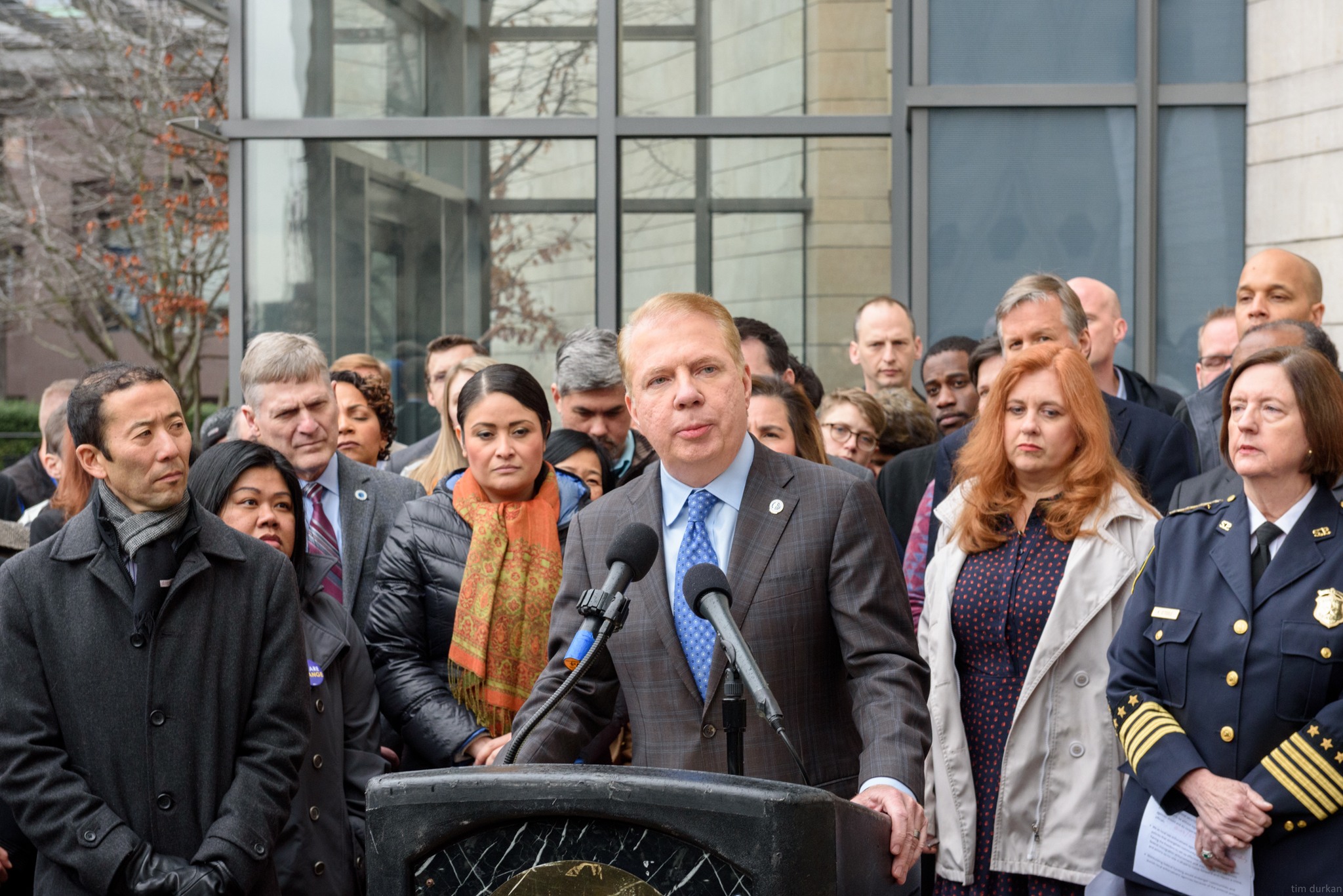The 2017 Seattle mayoral race got a lot more interesting this week, when Black Lives Matter activist Nikkita Oliver announced her candidacy against heavyweight incumbent Ed Murray. She’s a longshot candidate—although if the elections of Donald Trump and Kshama Sawant prove anything, it’s the foolishness of dismissing underdogs.
Oliver is challenging Murray from the populist Left, criticizing him for moving too timidly on critical issues like housing affordability and police reform and for being a member of Washington’s political elite. But what about challengers from the Right? Grumpy homeowners and conservative radio hosts love to hate Seattle’s mayor for being too timid on issues like adequate street parking and evicting homeless encampments. Could Seattle’s executive face a serious opponent running on a platform of no upzones and more homeless sweeps?
Not likely, says Tim Ceis, political consultant and Deputy Mayor in former Seattle Mayor Greg Nickels’ administration. “I’m not sure what runing from the Right means in Seattle,” he says, chuckling. “I haven’t heard of any challengers coming from a more centrist angle. I don’t expect to see it, and if that does happen, it won’t be a top tier candidate.” Ceis notes that Murray has pretty good favorability ratings and a mammoth campaign chest, two disincentives against conventional challengers.
Sandeep Kaushik, campaign manager for Murray, says the mayor takes nothing for granted in this election. “He intends to campaign hard,” says Kaushik. “He’s got a great case to make, we’ve got a great story to tell in his campaign.” Central to that pitch are the progressive successes Murray’s presided over, including a $15 minimum wage, expanded pre-kindergarten access, and the Housing Affordability and Livability Agenda (HALA). “It’s a long list of accomplishments that show not only does he share the progressive values of the Seattle public,” says Kaushik, “but that he knows how to translate those values into results.”
As we’ve previously reported, disdain for development is not always the same thing as being conservative, and the simple, binary continuum of Left vs. Right quickly breaks down in the liberaler-than-thou climate of Seattle. While some homeowner activists live up to cartoonish stereotypes of anti-poor Not In My Back Yarders, other so-called NIMBYs consider the development of land and rents from a Marxist perspective, and see themselves as standing up for the little guy against big, greedy developers. Exhibit A: Bill Bradburd. In 2015, Bradburd ran for city council on a platform of taxing developers to slow gentrification. “A lot of people argue Murray is the conservative, that he’s a neoliberal,” says Bradburd. (“Neoliberal” is a Marxist swear-word for pro-capitalist.) He points for instance to HALA, Murray’s task force-hatched plan to upzone parts of the city in exchange for more tax and fee revenue from developers, which goes on to subsidize affordable housing. Bradburd thinks that deal over-favors developers at the expense of livability.
Because of her grassroots platform and community legitimacy, he says, “I’m 100 percent behind Nikkita.”
“I think the biggest challenge for Ed is not Left vs. Right, but effective vs. ineffective,” says Mike McGinn, Murray’s vanquished predecessor. In 2013, voters booted McGinn and elected Murray, who ran on a platform that Crosscut’s Knute Berger described during the campaign as “safe, sane and aimed at the great Seattle middle — the liberal, middle class voters who aren’t particularly disenchanted.” But disenchantment’s stock has risen over the past few years, both nationally (see: Sanders, Bernie; Trump, Donald) and locally as rents continue to rise and homelessness spreads.
“Despite big tax increases, there has been surprisingly little progress on homelessness and housing costs,” says McGinn. “Similarly, new police officers come along with a double-digit increase in violent crime over three years. And the Community Police Commission recommendations for reform have been stalled for three years. No matter where the voter is on the spectrum, they have a right to expect results when over that same three years city spending has increased 25 percent.”
Still, with Oliver in the mix, candidates for mayor will no doubt be measured, in part, on a scale of left-to-right, and Murray will land well to the right of Oliver. This will be a new dynamic for the mayor compared to the last few months.
As the Seattle PI’s Joel Connelly observed in January, Murray has been essentially running against Donald Trump so far (and gods bless him for it). But that very political energy he’s been courting—from Seattle voters constipated by the outcomes of both the Democratic primary and the general presidential election last year—constitutes a real threat to the executive, who without a serious Right-wing challenger risks being cast as an establishment moderate in comparison to Oliver. Whether Oliver can harness that energy remains to be seen.
Murray seems aware of the dynamic. On Thursday, his re-election campaign sent out a press release enumerating his endorsements and focusing on his progressive victories. His endorsements include leaders and groups including state Attorney General Bob Ferguson, former governor Christine Gregoire, and a ton of labor unions.
And if that fails, there’s always money. He’s already raised a total of $270,000, with a little less than half that on hand.
cjaywork@seattleweekly.com








